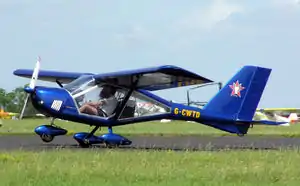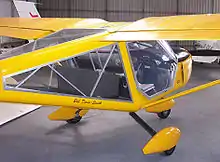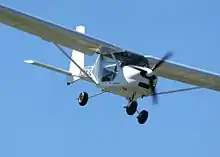Aeroprakt A-22 Foxbat
The Aeroprakt A-22 Foxbat is a Ukrainian two-seat, high-wing, tricycle landing gear ultralight aircraft that was designed by Yuri Yakovlev and is manufactured by Aeroprakt. In the United States the A-22 is referred to as the Valor,[1] while in the UK and Australia it is called the Foxbat. It has also been marketed as the Vision.[2][3][4] The Aeroprakt A-22 is supplied either as "ready-to-fly" factory built aircraft, or as a kit,[2] consisting of 152 pieces. The kit can be built in about 500 man-hours.
| A-22 Foxbat | |
|---|---|
 | |
| Role | Sports Light Aircraft |
| National origin | Ukraine |
| Manufacturer | Aeroprakt |
| Designer | Yuri Yakovlev |
| First flight | 21 October 1996 |
| Introduction | 1999 |
| Status | In production |
| Produced | 2000 to present |
| Variants | Aeroprakt A-32 Vixxen |

_RP429.jpg.webp)
.jpg.webp)
.jpg.webp)

Design and development
Aeroprakt of Kiev began design of the A-22 in February 1990, with the first prototype making its maiden flight on 21 October 1996, and a German-certified version entering production in 1999.[5]
The A-22's structure is almost completely metal with only the engine cowling, wing fillets and wheel spats being made of composites. The wings and control surfaces are fabric covered. The aircraft has excellent visibility, due to the large amount of glazing, including convex doors, that allow the occupants to look straight down. The A-22 uses a 3-axis control system, giving the pilot full control over the aircraft. The A-22 uses flaperons in place of ailerons and flaps, giving a stall speed of 52 km/h (32 mph) with the flaperons fully down.[2][6]
The kit comes with either the 80 hp (60 kW) Rotax 912UL or optionally the 100 hp (75 kW) Rotax 912ULS. The 85 hp (63 kW) Jabiru 2200 can also be fitted.[2][3]
Originally the A-22 came fitted with a 40-litre inboard fuel tank behind the seats, although later models have wing tanks holding 37.5 litres per side. The propeller is a 3-blade composite ground adjustable KievProp. Dual controls are standard, using a single central "Y" yoke or optionally twin yoke control system.
Variants
- A-22L2
- Version built in Ukraine with a higher gross weight of 600 kg (1,323 lb) for the landplane and 650 kg (1,433 lb) for the seaplane.[4]
- A-22LS
- Light-sport version for the American market with a higher gross weight of 600 kg (1,323 lb) for the landplane and 650 kg (1,433 lb) for the seaplane.[4]
Specifications (A-22 Valor, Rotax 912 ULS engine)
Data from Jane's All The World's Aircraft 2003–2004[5]
General characteristics
- Crew: one
- Capacity: one passenger
- Length: 6.3 m (20 ft 8 in)
- Wingspan: 10.10 m (33 ft 2 in)
- Height: 2.4 m (7 ft 10 in)
- Wing area: 13.7 m2 (147 sq ft)
- Airfoil: TsAGI P-IIIA-15[7]
- Empty weight: 260 kg (573 lb)
- Max takeoff weight: 450 kg (992 lb)
- Powerplant: 1 × Rotax 912ULS 4-cylinder air-cooled horizontally-opposed piston engine, 73.5 kW (98.6 hp)
- Propellers: 3-bladed Aeroprakt ground-adjustable propeller, 1.68 m (5 ft 6 in) diameter
Performance
- Maximum speed: 170 km/h (110 mph, 92 kn)
- Cruise speed: 160 km/h (99 mph, 86 kn)
- Stall speed: 55 km/h (34 mph, 30 kn)
- Range: 1,100 km (680 mi, 590 nmi) with maximum fuel
- Service ceiling: 4,000 m (13,000 ft)
- g limits: +4/-2
- Rate of climb: 5 m/s (980 ft/min)
- Power/mass: 0.166 kW/kg (0.101 hp/lb)
- Take-off run: 90 m (295 ft)
- Landing run: 90 m (295 ft)
References
- "Aeroprakt A-22 / Valor / Foxbat / Sharik / FPNA Capetown". all-aero.com. Retrieved 3 January 2020.
- Bayerl, Robby; Berkemeier, Martin; et al. (2011). World Directory of Leisure Aviation 2011-12. Lancaster: WDLA UK. p. 20. ISSN 1368-485X.
- Bertrand, Noel; Coulon, Rene; et al. (2003). "Aeroprakt A-22". World Directory of Leisure Aviation 2003-04. Lancaster OK: Pagefast Ltd.: 118. ISSN 1368-485X.
- Tacke, Willi; Boric, Marino; et al. (2015). "Aeroprakt A-22". World Directory of Light Aviation 2015-16. Flying Pages Europe SARL: 17. ISSN 1368-485X.
- Jackson, Paul, ed. (2003). Jane's All the World's Aircraft 2003-04 (94th ed.). Coulsdon, Surrey, United Kingdom: Jane's Information Group. pp. 464–465. ISBN 0-7106-2537-5.
- "Welcome to Foxbat UK". foxbataircraft. Retrieved 3 January 2020.
- Lednicer, David. "The Incomplete Guide to Airfoil Usage". m-selig.ae.illinois.edu. Retrieved 16 April 2019.